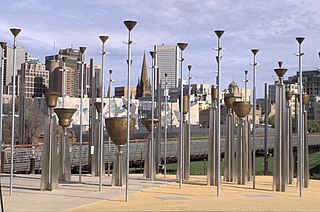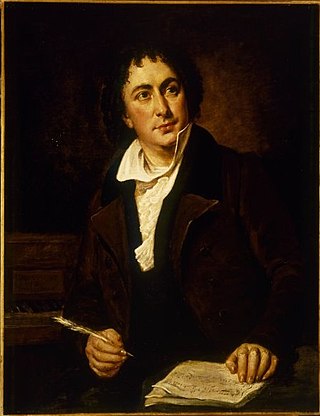Related Research Articles

Byzantine music is the music of the Byzantine Empire. Originally it consisted of songs and hymns composed to Greek texts used for courtly ceremonials, during festivals, or as paraliturgical and liturgical music. The ecclesiastical forms of Byzantine music are the best known forms today, because different Orthodox traditions still identify with the heritage of Byzantine music, when their cantors sing monodic chant out of the traditional chant books such as the Sticherarion, which in fact consisted of five books, and the Irmologion.

Matthew Ingvald Dewey is an Australian classical music composer, singer, and music producer.
Constantine Koukias is a Tasmanian composer and opera director of Greek ancestry based in Amsterdam, where he is known by his Greek name of Konstantin Koukias. He is the co-founder and artistic director of IHOS Music Theatre and Opera, which was established in 1990 in Tasmania's capital city, Hobart.
Damien Ricketson is an Australian composer of contemporary classical music. He is best known for his innovative compositional practice and in his capacity as the co-founder and co-artistic director of Ensemble Offspring. He is currently a lecturer and program leader in composition at the Sydney Conservatorium of Music, of which he is also an alumnus.

Theatre of Australia refers to the history of the performing arts in Australia, or produced by Australians. There are theatrical and dramatic aspects to a number of Indigenous Australian ceremonies such as the corroboree. During its colonial period, Australian theatrical arts were generally linked to the broader traditions of English literature and to British and Irish theatre. Australian literature and theatrical artists have over the last two centuries introduced the culture of Australia and the character of a new continent to the world stage.

Federation Bells is an installation comprising 39 upturned bells. Located in Birrarung Marr, Melbourne, they were created for celebrations of the centenary of Australia's federation in 2001. They were designed by Anton Hasell and Neil McLachlan in collaboration with Swaney Draper Architects. To achieve the acoustical tuning of the bells, Behzad Keramati Nigjeh, an aerospace engineer, also cooperated in this project. The bell's vibration modes were modelled and optimised using a sophisticated Finite Element software developed by Dr Joe Tomas.
Days and Nights with Christ is the first of five full-scale operas by the Constantine Koukias a Tasmanian composer and opera director of Greek ancestry based in Amsterdam, where he is known by his Greek name of Konstantin Koukias. This was the first opera / music theatre production by IHOS Experimental Theatre Troupe. It premiered at Hobart's Salamanca Arts Festival in 1990 and two years later was a highlight of the Festival of Sydney. The work, which explores images associated with schizophrenia, was inspired by the experiences of the composer's brother and by their shared Greek heritage.
To Traverse Water is an opera by Constantine Koukias a Tasmanian composer and opera director of Greek ancestry based in Amsterdam, where he is known by his Greek name of Konstantin Koukias. The opera depicts a young Greek woman's departure for Australia and her settlement there. Her tale is loosely based on that of Koukias’ mother, and the opera makes direct reference to her at the end of the show when a slide picture of her appears, along with a tape of her voice intoning an old village song.
Tesla – Lightning in His Hand is a large-scale opera about Serbian American engineer and inventor Nikola Tesla (1856–1943), composed by Constantine Koukias, a Tasmanian composer and opera director of Greek ancestry based in Amsterdam, where he is known by his Greek name of Konstantin Koukias, with libretto by Marianne Fisher.
The Lunch Box is a chamber opera by Thai composer Thanapoom Sirichang and Thai librettist Bringkop Vora-Urai. Composed entirely in Tasmania under the guidance of IHOS Artistic Director Constantine Koukias, The Lunch Box may be the first opera sung in Thai to blend traditional Thai music and contemporary Western opera.
MIKROVION, by Constantine Koukias a Tasmanian composer and opera director of Greek ancestry based in Amsterdam, where he is known by his Greek name of Konstantin Koukias. This opera is described by Maria Shevtsova as "an epic opera about AIDS".
The Divine Kiss — The Evil is Always and Everywhere is an opera by Constantine Koukias a Tasmanian composer and opera director of Greek ancestry based in Amsterdam, where he is known by his Greek name of Konstantin Koukias. The opera explores the imagery of the seven saving virtues: prudence, justice, fortitude, temperance, faith, hope and charity.
Olegas is an opera based on the life of Lithuanian-born Tasmanian wilderness photographer Olegas Truchanas. Music for the opera was composed by Constantine Koukias a Tasmanian composer and opera director of Greek ancestry based in Amsterdam, where he is known by his Greek name of Konstantin Koukias. The libretto was written by Natasha Cica.

Knowledge of the biblical period is mostly from literary references in the Bible and post-biblical sources. Religion and music historian Herbert Lockyer, Jr. writes that "music, both vocal and instrumental, was well cultivated among the Hebrews, the New Testament Christians, and the Christian church through the centuries." He adds that "a look at the Old Testament reveals how God's ancient people were devoted to the study and practice of music, which holds a unique place in the historical and prophetic books, as well as the Psalter."
IHOS Music Theatre and Opera is a Tasmanian opera company was established in Hobart in 1990, by composer and artistic director Constantine Koukias, and production director Werner Ihlenfeld to create original music-theatre and opera works.
The Priest's Passion is a one scene chamber opera by Australian composer Matthew Dewey, and was first produced by the IHOS Music Theatre Laboratory together with the Tasmanian Conservatorium of Music in September 2004. It premiered at the Stanley Burbury Theatre at the University of Tasmania in 2004 and was subsequently recorded by ABC Classic FM. The work, which explores the nature of religious angst is a symbolist opera.

Cantor Yitzchak Meir Helfgot is an Israeli-born Hasidic Orthodox Jewish cantor, known for his vocal dexterity and range. Like some operatic tenors he is capable of sustaining long passages in the difficult uppermost tessitura, while also possessing overt technical facility in executing ornate melismas.

The earliest western musical influences in Australia can be traced to two distinct sources: in the first settlements, the large body of convicts, soldiers and sailors who brought the traditional folk music of England, Wales, Scotland and Ireland; and the first free settlers, some of whom had been exposed to the European classical music tradition in their upbringing. An example of original music by a convict would be an 1861 tune dedicated to settler James Gordon by fiddler constable Alexander Laing. Very little music has survived from this early period, although there are samples of music originating from Sydney and Hobart that date back to the early 19th century. Musical publications from this period preserved in Australian libraries include works by Charles Edward Horsley, William Stanley, Isaac Nathan, Charles Sandys Packer, Frederick Augustus Packer, Carl Linger, Francis Hartwell Henslowe, Frederick Ellard, Raimund Pechotsch and Julius Siede.
Gordon Kerry is an Australian composer, music administrator, music writer and music critic.

George Ellis is an Australian conductor, composer and orchestrator. He presents concerts for international events with a broad range of styles from classical to pop/rock and jazz as well as presenting orchestral concerts for young audiences. He also lectures in conducting at the Sydney Conservatorium of Music, and is a regular presenter of Sonic Journey for ABC Radio Sydney’s program with Simon Marnie.
References
- ↑ Archived at Ghostarchive and the Wayback Machine : Prayer Bells IHOS Opera. YouTube .
- ↑ Kerry, Gordon 2009, New Classical Music: Composing Australia, UNSW Press, Sydney
- ↑ Hume, Kirk 2006, "Bells make for glowing finale", Opera Opera, August 2006
- ↑ Kerry, Gordon 2009, New Classical Music: Composing Australia, UNSW Press, Sydney
- ↑ Museum Victoria, "The Federation Handbells Archived 2008-07-29 at the Wayback Machine
- ↑ Kerry, Gordon 2009, New Classical Music: Composing Australia, UNSW Press, Sydney